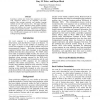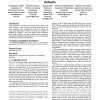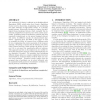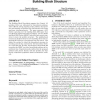1310 search results - page 155 / 262 » A parallel genetic algorithm to solve the set-covering probl... |
100
click to vote
KDD
1998
ACM
15 years 2 months ago
1998
ACM
Learning to predict rare events from sequences of events with categorical features is an important, real-world, problem that existing statistical and machine learning methods are ...
SBIA
1998
Springer
15 years 2 months ago
1998
Springer
This paper presents Darwinci, a system that generates new ideas, using a multi-domain knowledge base composed by musical and drawing structures. Its theoretical background comes fr...
GECCO
2007
Springer
15 years 4 months ago
2007
Springer
Credit institutions are seldom faced with problems dealing with single objectives. Often, decisions involving optimizing two or more competing goals simultaneously need to be made...
113
click to vote
GECCO
2007
Springer
15 years 1 months ago
2007
Springer
The traditional GA theory is pillared on the Building Block Hypothesis (BBH) which states that Genetic Algorithms (GAs) work by discovering, emphasizing and recombining low order ...
GECCO
2007
Springer
15 years 1 months ago
2007
Springer
The Building Block Hypothesis suggests that Genetic Algorithms (GAs) are well-suited for hierarchical problems, where efficient solving requires proper problem decomposition and a...




